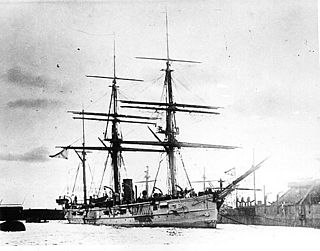Related Research Articles

Impressment, colloquially "the press" or the "press gang", is the taking of men into a military or naval force by compulsion, with or without notice. European navies of several nations used forced recruitment by various means. The large size of the British Royal Navy in the Age of Sail meant impressment was most commonly associated with Great Britain and Ireland. It was used by the Royal Navy in wartime, beginning in 1664 and during the 18th and early 19th centuries as a means of crewing warships, although legal sanction for the practice can be traced back to the time of Edward I of England. The Royal Navy impressed many merchant sailors, as well as some sailors from other, mostly European, nations. People liable to impressment were "eligible men of seafaring habits between the ages of 18 and 55 years". Non-seamen were sometimes impressed as well, though rarely. In addition to the Royal Navy's use of impressment, the British Army also experimented with impressment from 1778 to 1780.

Central London Property Trust Ltd v High Trees House Ltd [1947] KB 130 is a famous English contract law decision in the High Court. It reaffirmed and extended the doctrine of promissory estoppel in contract law in England and Wales. However, the most significant part of the judgment is obiter dicta as it relates to hypothetical facts; that is, the landlord did not seek repayment of the full wartime rent.
Consideration is an English common law concept within the law of contract, and is a necessity for simple contracts. The concept of consideration has been adopted by other common law jurisdictions, including the US.
Guarantee is a legal term more comprehensive and of higher import than either warranty or "security". It most commonly designates a private transaction by means of which one person, to obtain some trust, confidence or credit for another, engages to be answerable for him. It may also designate a treaty through which claims, rights or possessions are secured. It is to be differentiated from the colloquial "personal guarantee" in that a guarantee is a legal concept which produces an economic effect. A personal guarantee by contrast is often used to refer to a promise made by an individual which is supported by, or assured through, the word of the individual. In the same way, a guarantee produces a legal effect wherein one party affirms the promise of another by promising to themselves pay if default occurs.

Balfour v Balfour [1919] 2 KB 571 is a leading English contract law case. It held that there is a rebuttable presumption against an intention to create a legally enforceable agreement when the agreement is domestic in nature.
The pre-existing duty rule is an aspect of consideration within the law of contract. Originating in England the concept of consideration has been adopted by other jurisdictions, including the US.

Consideration is a concept of English common law and is a necessity for simple contracts but not for special contracts. The concept has been adopted by other common law jurisdictions.

English contract law is the body of law that regulates legally binding agreements in England and Wales. With its roots in the lex mercatoria and the activism of the judiciary during the industrial revolution, it shares a heritage with countries across the Commonwealth, from membership in the European Union, continuing membership in Unidroit, and to a lesser extent the United States. Any agreement that is enforceable in court is a contract. A contract is a voluntary obligation, contrasting to the duty to not violate others rights in tort or unjust enrichment. English law places a high value on ensuring people have truly consented to the deals that bind them in court, so long as they comply with statutory and human rights.

A contract is a legally enforceable agreement that creates, defines, and governs mutual rights and obligations among its parties. A contract typically involves the transfer of goods, services, money, or a promise to transfer any of those at a future date. In the event of a breach of contract, the injured party may seek judicial remedies such as damages or rescission. Contract law, the field of the law of obligations concerned with contracts, is based on the principle that agreements must be honoured.

Williams v Roffey Bros & Nicholls (Contractors) Ltd[1989] EWCA Civ 5 is a leading English contract law case. It decided that in varying a contract, a promise to perform a pre-existing contractual obligation will constitute good consideration so long as a benefit is conferred upon the 'promiseor'. This was a departure from the previously established principle that promises to perform pre-existing contractual obligations could not be good consideration.

Stilk v Myrick [1809] EWHC KB J58 is an English contract law case heard in the King's Bench on the subject of consideration. In his verdict, the judge, Lord Ellenborough decided that in cases where an individual was bound to do a duty under an existing contract, that duty could not be considered valid consideration for a new contract. It has been distinguished from Williams v Roffey Bros & Nicholls (Contractors) Ltd, which suggested that situations formerly handled by consideration could instead be handled by the doctrine of economic duress.

Cutter v Powell (1795) 101 ER 573 is an English contract law case, concerning substantial performance of a contract.
The law of salvage is a principle of maritime law whereby any person who helps recover another person's ship or cargo in peril at sea is entitled to a reward commensurate with the value of the property salved.
Privity is a doctrine in English contract law that covers the relationship between parties to a contract and other parties or agents. At its most basic level, the rule is that a contract can neither give rights to, nor impose obligations on, anyone who is not a party to the original agreement, i.e. a "third party". Historically, third parties could enforce the terms of a contract, as evidenced in Provender v Wood, but the law changed in a series of cases in the 19th and early 20th centuries, the most well known of which are Tweddle v Atkinson in 1861 and Dunlop Pneumatic Tyre v Selfridge and Co Ltd in 1915.

Shadwell v Shadwell [1860] EWHC CP J88 is an English contract law case, which held that it would be a valid consideration for the court to enforce a contract if a pre-existing duty was performed, so long as it was for a third party.
During April 1947, the Royal New Zealand Navy (RNZN) experienced a series of non-violent mutinies amongst the enlisted sailors of four ships and two shore bases. Over 20% of the RNZN's enlisted personnel were punished or discharged for their involvement. The main cause was the poor rates of pay compared to the rest of the New Zealand Defence Force and equivalent civilian wages, exacerbated by the release of a long overdue government review which failed to address the issue. Sailors saw the new pay rates as still inferior to the other branches of the military, with the increases being consumed by taxes, inflation, and the cancellation of allowances and benefits. The poor living and working conditions aboard RNZN ships was another issue, compounded by sailors having no effective way to make dissatisfaction known to the higher ranks. Dissatisfaction with peacetime duties and opportunities also contributed, with many sailors locked into enlistment periods of up to 12 years, and demobilisation efforts prioritising those enlisted specifically for the duration of World War II.
Atlas Express v. Kafco Ltd. [1989] QB 833 is an English contract law case relating to duress.

Glasbrook Brothers Ltd. v Glamorgan County Council [1924] UKHL 3 is an English contract law and labour law case concerning the liability of private parties paying for extra police protection.
The Act for the Better Regulation and Government of Seamen in the Merchants Service was a significant piece of British legislation passed in 1729. The Act was originally stipulated to run five years but was renewed periodically until it was made perpetual by 2 Geo. III, c. 5 in 1761. By mandating a formalized wage contract, the Act deterred captains from changing agreed-upon routes of their vessels, reduced desertion rates, and allowed for seamen to seek liberation from employers who broke contracts.

Cook Islands Shipping Co Ltd v Colson Builders Ltd [1975] 1 NZLR 422 is a cited case in New Zealand regarding performance of an existing contractual duty to a promisor in economic duress. This case reinforces the English case of Stilk v Myrick (1809) 2 Camp 317; 170 ER 1168
References
- E McKendrick, Contract Law (7th edn Palgrave Macmillan 2007)